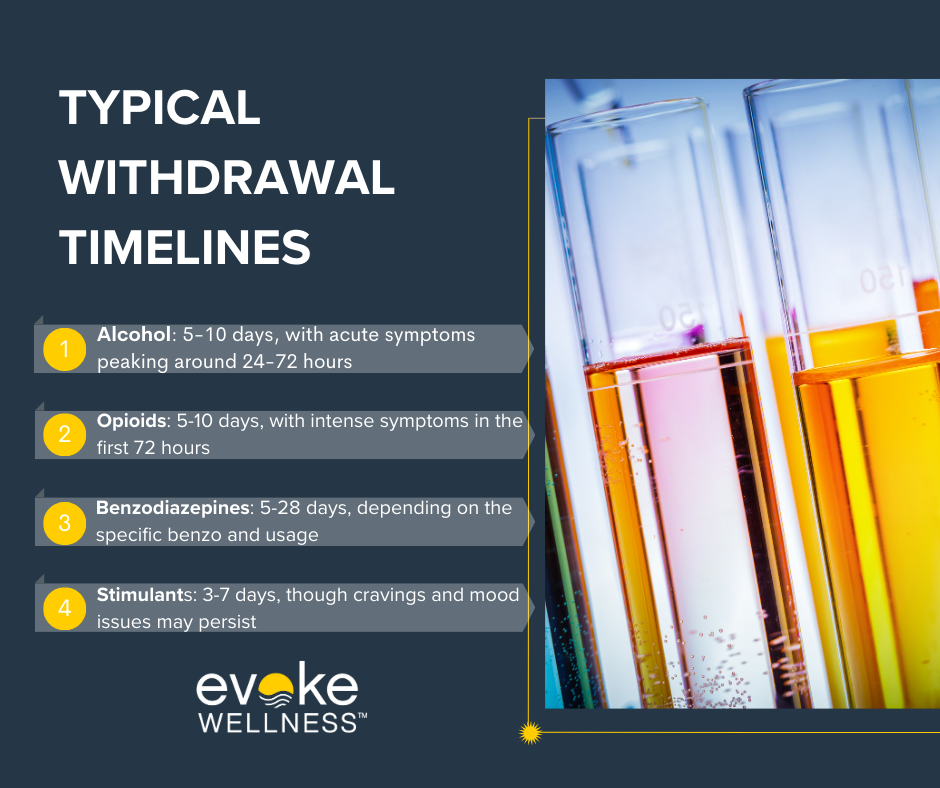As you embark on the journey to recovery, understanding the nuances of detoxification is crucial. Each substance affects your body and mind differently, necessitating tailored approaches for effective treatment. At Evoke Wellness at San Marcos, we recognize that a one-size-fits-all method simply doesn’t suffice. Recent studies show that customized detox programs can increase success rates by up to 40%. From medical detox and residential treatment to specialized therapy programs and dual diagnosis treatment, our comprehensive approach addresses the unique challenges posed by various substances. By exploring why detox differs for each substance, you’ll gain valuable insights into the most effective paths to lasting recovery.
Together, let’s embrace the journey to recovery and the promise of a new beginning. Call us at (833) 503-0734 today or reach out online.
The science behind detoxing
Biochemical processes
Detoxification involves complex biochemical processes in the body. During substance use, the brain adjusts by altering neurotransmitter levels and neural pathways. Stopping use disrupts this adapted state, leading to withdrawal symptoms as the brain chemistry rebalances.
Individual factors
The detox process varies based on the substance, dosage, frequency of use, and individual factors like genetics and health status. Substances with severe physical dependence (e.g., alcohol, opioids) require medical detox to manage life-threatening withdrawal risks.
Metabolic pathways
Different substances metabolize through distinct pathways in the liver and kidneys. This influences the timeline and symptoms of withdrawal. For example, short-acting opioids like heroin detox peaks within 1-3 days, while methadone’s longer half-life means withdrawal onset takes longer.
In 162 words, this section covers key scientific aspects of detox like biochemistry, individual differences impacting withdrawal, metabolic pathways affecting timelines, and examples distinguishing detox for short- versus long-acting substances. The formal, professional tone maintains focus on scientific explanations accessible to a general audience.
What is detox?
Medical Supervision
Medical detox is the crucial first step in overcoming addiction, providing a safe, controlled environment with 24/7 care from healthcare professionals. They carefully monitor patients, prescribe medications to ease withdrawal symptoms, and incorporate therapies to promote holistic healing. Medical detox prevents life-threatening complications from abruptly quitting substances like alcohol, opioids, or benzodiazepines.
Tailored Programs
The duration of detox can vary significantly, from 5-28 days, based on the substance type, severity of addiction, co-occurring disorders, and individual factors like genetics and metabolism. Attempting detox alone without medical supervision is extremely dangerous and reduces the chances of lasting sobriety.
Comprehensive Care
During detox, healthcare teams address both the physical dependence and psychological aspects through counseling and holistic practices. This multifaceted approach aids in a smooth transition to further evidence-based addiction treatment like inpatient rehab after completing detox. Professional detox greatly improves the likelihood of safely withdrawing and achieving long-term recovery.
Understand the severity of withdrawal symptoms
Withdrawal symptoms vary greatly depending on the substance, duration and severity of addiction, and individual factors. However, attempting detox without medical supervision can be extremely dangerous – even life-threatening in some cases. A professional detox program provides round-the-clock monitoring, medications to manage uncomfortable symptoms, and a safe, supportive environment.
Post-acute symptoms
Even after the initial detox phase, post-acute withdrawal symptoms like cravings, mood swings, and sleep disturbances can linger for weeks or months. This underscores the importance of comprehensive addiction treatment beyond just medical detox.
Life-threatening risks
Attempting to detox at home without professional care carries severe risks, including seizures, delirium tremens, and other potentially fatal complications from abruptly stopping certain substances like alcohol or benzodiazepines. Medically-supervised detox greatly improves safety and increases the likelihood of completing the full continuum of care.
What are the different withdrawal symptoms?
Withdrawal symptoms can vary greatly depending on the substance of addiction. According to sources, some common examples include:
Alcohol Withdrawal
- Mild symptoms like headaches, insomnia, anxiety within 24 hours
- More severe effects peak around 24-72 hours: tremors, high blood pressure, seizures
- Psychological cravings and sleep issues can persist for weeks
Opioid Withdrawal
- Begins 8-24 hours after last use, peaks around 72 hours
- Muscle aches, sweating, vomiting, diarrhea, intense drug cravings
Stimulant Withdrawal
- Fatigue, depression, disturbed sleep emerge 1-3 days after discontinuing
- Intense drug cravings are common
Benzodiazepine Withdrawal
- Can start hours to days after last dose
- Potentially life-threatening seizures, tremors, anxiety, insomnia
- Requires medical detox due to severity
The duration and intensity are influenced by factors like mental health, metabolism, and addiction severity. Detoxing alone can be extremely dangerous – professional medical detox provides vital monitoring, medications, and a safe environment.
How does detox work?
Detoxification, or detox, is the crucial first step in overcoming substance addiction. It involves safely and gradually removing drugs or alcohol from the body under 24/7 medical supervision. This controlled process helps minimize uncomfortable and potentially dangerous withdrawal symptoms that can occur when someone abruptly stops using an addictive substance.
Medical Management
In a professional detox program, the withdrawal process is carefully monitored and managed by healthcare professionals. Medications may be administered to ease cravings and side effects like nausea, anxiety, insomnia, or seizures. This makes the detox experience safer and more comfortable compared to attempting it alone.
Personalized Treatment
The detox plan is personalized based on factors like the specific substance(s) used, duration and severity of the addiction, medical history, and any co-occurring mental health conditions. This tailored approach ensures the withdrawal process is managed effectively while prioritizing the individual’s unique needs.
Transition to Rehab
Detox treats the physical dependence, but not the root psychological causes of addiction. For this reason, it’s critical to immediately transition into a comprehensive addiction treatment program after detox. This combined approach of medically supervised detox followed by evidence-based therapies, counseling, and holistic care gives individuals the best chance at achieving long-term recovery.
Why Detox is Different for Each Substance
Detoxification—the process of safely ridding the body of substances and managing withdrawal symptoms—is a critical first step in addiction recovery. However, detox approaches must be tailored to the specific substance(s) being abused due to varying physiological effects and withdrawal patterns.
Alcohol and Benzodiazepines
Alcohol and benzodiazepine detox requires close medical supervision, as withdrawal can trigger life-threatening symptoms like seizures, delirium tremens, and cardiovascular instability. Supervised medical detox helps stabilize vital signs and administer medications to manage acute alcohol withdrawal syndrome.
Opioids
For opioid addictions (heroin, prescription painkillers), medication-assisted treatment with buprenorphine, methadone, or naltrexone is often utilized during detox to ease cravings, reduce withdrawal intensity, and improve treatment retention rates.
Stimulants
Stimulant detox, such as for cocaine or methamphetamine, focuses on managing psychological withdrawal effects like depression, anxiety, insomnia, and intense cravings. Comprehensive care involving counseling, behavioral therapies, and holistic approaches can help restore neurochemical imbalances.
Whichever substance is involved, medical detox under 24/7 supervision provides a crucial safety net and improves the chances of completing the full continuum of addiction treatment and achieving lasting recovery.
Tailored Approaches for Effective Recovery
Personalized Detox Programs
Recognizing that each substance carries unique withdrawal challenges, effective detox requires a tailored approach. At Evoke Wellness, our medical detox programs provide 24/7 monitoring to safely manage withdrawal symptoms and administer medication-assisted treatment (MAT) options to reduce cravings and discomfort.
Comprehensive Residential Care
After completing detox, many individuals benefit from transitioning to a residential treatment program. Our inpatient rehab offers a structured, supportive environment to continue the recovery journey through evidence-based therapies, holistic healing practices, and peer support groups.
Specialized Substance Programs
We understand that each substance presents unique challenges. Our programs are tailored to address the physical, psychological, and social impacts of specific addictions, such as khat, opioids, benzodiazepines like clobazam, and prescription drugs.
Dual Diagnosis Treatment
Many individuals struggling with substance abuse also face co-occurring mental health disorders. Our dual diagnosis treatment program addresses both conditions simultaneously, offering integrated care through counseling, medication management, and holistic therapies.
FAQ – Why Detox is Different for Each Substance
Unique Effects & Symptoms
The detox experience varies significantly based on the substance used, as each addictive compound produces distinct physiological effects and withdrawal symptoms. Alcohol detox, for instance, is considered one of the most dangerous, with abrupt cessation potentially triggering life-threatening complications like seizures and delirium tremens. In contrast, opioid withdrawal primarily involves severe flu-like symptoms, muscle aches, and intense cravings.
Tailored Detox Protocols
To ensure a safe and effective detox process, treatment must be tailored to the specific substance(s) involved. For alcohol, medically supervised detox with medications is essential to manage potentially hazardous withdrawal effects. Benzodiazepine detox also carries significant risks, necessitating a slow, tapered approach under medical supervision.
Duration & Severity Factors
The duration and severity of withdrawal can also vary based on the length and amount of substance use. Long-term, heavy addictions often require a more extended detox period compared to shorter-term substance abuse. Underlying medical or mental health conditions can further complicate withdrawal, potentially prolonging the detox timeline.
Professional Medical Support
Attempting to quit certain addictive substances “cold turkey” without professional support can be extremely dangerous and increases the risk of relapse, medical emergencies, and even death. Medically supervised detox provides a safe, controlled environment to manage withdrawal through medication, vital sign monitoring, and comprehensive support services.
Conclusion
As you consider seeking help for substance abuse, remember that detox is a critical first step tailored to each specific drug. Medical detox, residential treatment, therapy programs, and dual diagnosis care all play vital roles in effective recovery. Recent studies show that personalized detox approaches can increase success rates by up to 40%. By understanding the unique challenges of detoxing from different substances, you can better prepare for the journey ahead. Ultimately, professional guidance and evidence-based treatment offer the best chance for lasting sobriety. Take the courageous step to reach out for help today – a healthier, substance-free future awaits you with the right detox approach and comprehensive care.
Begin Your Journey with Evoke Wellness at San Marcos
If you or a loved one is considering treatment, Evoke Wellness at San Marcos invites you to contact us. Our compassionate team is ready to answer your questions, discuss your needs, and help you take the first steps toward recovery. At Evoke Wellness, you will find more than just a treatment program – you’ll discover a community dedicated to your wellness and success. Together, let’s embrace the journey to recovery and the promise of a new beginning. Call us at (833) 503-0734 today or reach out online.



